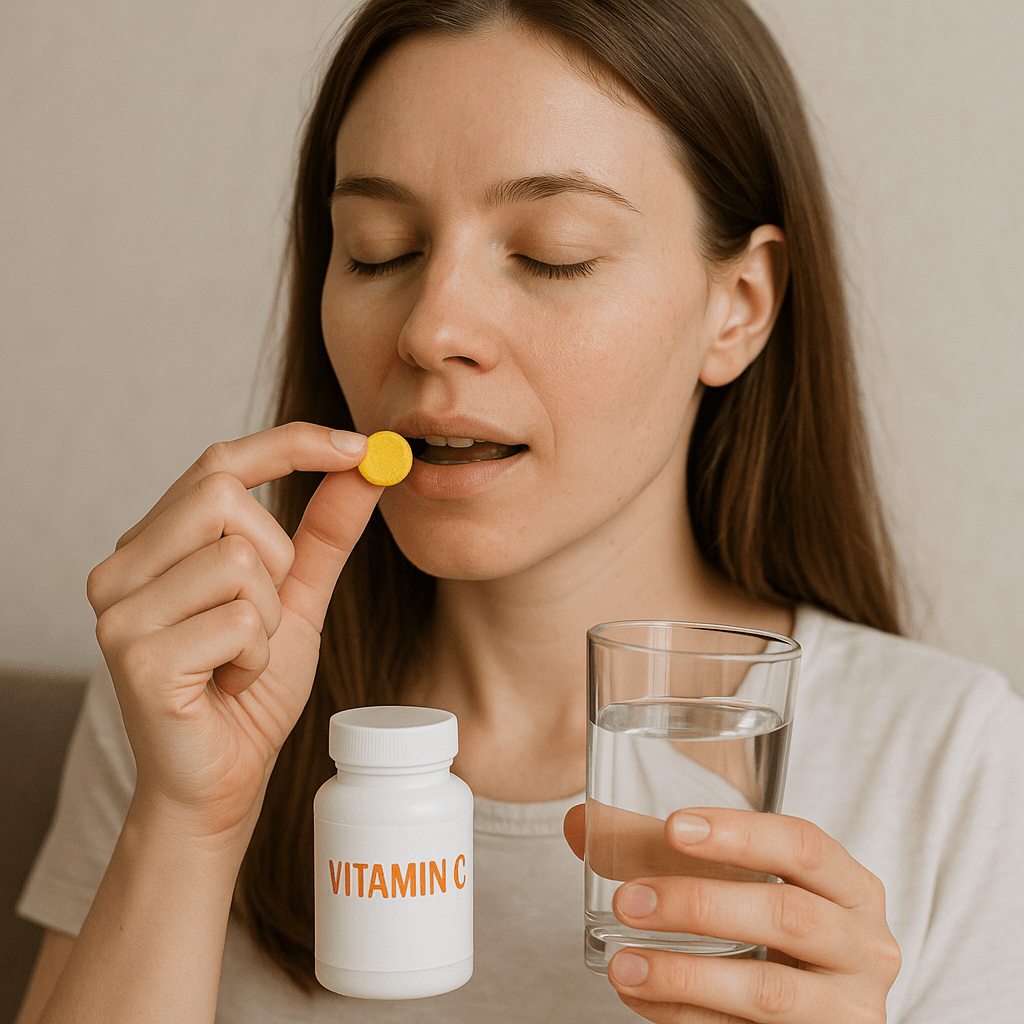Vitamin C is one of the most important and popular vitamins that our body needs every day. It performs many important functions: it strengthens immunity, improves iron absorption and is involved in the production of collagen. Although we know a lot about the importance of this vitamin, questions often arise about how to take it properly, in what doses and when. Vitamins for immunity are natural or organic food supplements, such as vitamin C, which help maintain the body’s normal defenses against diseases and strengthen overall well-being.
In this detailed article, we will review the most important aspects of vitamin C consumption: what are its benefits, how to determine the correct dosage, when is the best time to take it, how to choose between natural sources and supplements, and what precautions should be taken. You will learn how to make the most of this important antioxidant and avoid possible side effects.
Why is vitamin C important: main benefits and functions
Vitamin C, also known as ascorbic acid, is a water-soluble vitamin that performs many vital functions in our body. This micronutrient is essential in the daily diet, as the human body cannot produce it on its own.
One of the most important functions of vitamin C is to strengthen the immune system. It activates the production of white blood cells, which fight infections and diseases. In addition, vitamin C helps protect these cells from oxidative damage caused by free radicals. Due to these properties, the use of vitamin C is especially recommended during the cold season.

Another essential function of this vitamin is its participation in collagen synthesis. Collagen is a protein that is essential for the formation of skin, tendons, ligaments and blood vessels. For this reason, vitamin C is indispensable for maintaining skin health, wound healing and general tissue regeneration in the body.
Vitamin C also improves the absorption of non-heme iron (found in plant foods), making it especially beneficial for vegetarians and vegans. By helping the body better absorb iron, it helps prevent iron deficiency anemia.
The antioxidant properties of vitamin C protect the body from oxidative stress, a condition in which free radicals increase in the body, which can damage cells and tissues. Long-term oxidative stress is associated with various chronic diseases, including heart disease and cancer.
For many people, vitamin C deficiency can manifest itself in fatigue, slow wound healing, bleeding gums or even the classic deficiency disease – scurvy (although the latter is rare in modern societies). Regular consumption of sufficient amounts of vitamin C helps prevent these undesirable effects and ensure optimal body functioning.
Daily Dose: How Much Vitamin C Do You Really Need?
Vitamin C dosage depends on age, gender, physiological condition and individual needs of the body. In order to avoid deficiency or overdose, it is important to know the recommended daily allowance.
According to the recommendations of the European Food Safety Authority (EFSA), adults are recommended to consume 80-90 mg of vitamin C daily. However, the recommendations of the Lithuanian Ministry of Health are somewhat different: men are advised to consume 90 mg, and women – 75 mg of vitamin C per day.
There are specific groups that need higher amounts of vitamin C:
- pregnant women – 85 mg per day
- breastfeeding women – 120 mg per day
- smokers – additional 35 mg (due to higher
- oxidative stress)
- athletes – may need 100-200 mg or more,
- depending on the intensity of training
- elderly people – may need higher doses due to poorer absorption
Children’s vitamin C needs also vary by age:
- infants up to 6 months – 40 mg per day
- infants from 7 to 12 months – 50 mg per day
- for children from 1 to 3 years – 15 mg per day
- for children from 4 to 8 years – 25 mg per day
- for children from 9 to 13 years – 45 mg per day
- for adolescents from 14 to 18 years – 65-75 mg per day
It is important to note that the body can only absorb a certain amount of vitamin C at a time. Studies have shown that the absorption efficiency decreases with increasing dose. For example, when taking a 30 mg dose, the body absorbs about 90% of the vitamin, while when taking 1000 mg – only about 50%.
Although vitamin C is relatively safe even in higher doses (since it is water-soluble and the excess is eliminated in the urine), it is recommended not to exceed a dose of 2000 mg per day to avoid possible digestive tract disorders or an increased risk of kidney stone formation.
The most common question: is it worth taking megadoses of vitamin C (1000 mg and more) during cold or flu season? Scientific research results are conflicting – some studies show that high doses of vitamin C can slightly shorten the duration of the illness, but do not prevent the disease itself. Such doses are recommended to be taken only for a short time and after consulting a doctor.
The Best Time and Way to Take Vitamin C for Maximum Absorption
The right time and way to take vitamin C can significantly increase its effectiveness and reduce potential side effects. How and when is the best time to take this vitamin for maximum benefit?
Vitamin C is a water-soluble vitamin, so it is best to take it with or immediately after food to avoid potential stomach irritation.

This is especially important for people who suffer from high stomach acid or are sensitive to gastrointestinal problems.
Many experts recommend taking oral vitamin C in the morning, as it helps maintain energy levels throughout the day and provides the body with the necessary antioxidants during the active period of the day. In addition, morning intake can ensure better absorption, since the body is usually most active at that time.
Due to the short half-life of vitamin C (about 2 hours), its concentration in the blood decreases quickly. Therefore, many experts recommend dividing the dose and taking it several times a day, for example, in the morning and in the afternoon. This will help maintain a more stable concentration of the vitamin in the blood.
If you are taking vitamin C powder, it is best to dissolve it in water and drink it immediately. If the solution is kept for a longer period, vitamin C oxidizes and loses its effectiveness. It is also important to know that hot water can destroy some of the vitamin C, so it is better to dissolve the powder in room temperature or cool water.
Regarding vitamin C absorption, some studies suggest that liposomal vitamin C may be better absorbed than regular forms. Liposomal vitamin C is coated with fat particles, which helps it penetrate cell membranes better.
Combining Vitamin C with Other Nutrients
By properly combining vitamin C with other vitamins and minerals, its benefits and effectiveness can be optimized. Here are some important combinations:
Vitamin C significantly improves the absorption of non-heme iron (found in plant foods), so iron supplements are best taken together with vitamin C. Studies show that vitamin C can increase iron absorption by up to 3-6 times.
When it comes to the combination of vitamin C and zinc, these two trace elements work synergistically to strengthen immunity. Zinc and vitamin C are often recommended to be taken together during cold season or at the first symptoms of illness.
Vitamin C and vitamin E also complement each other well, as both are powerful antioxidants. Vitamin E is fat-soluble and protects cell membranes, while water-soluble vitamin C regenerates oxidized vitamin E, thus enhancing the overall antioxidant effect.
However, attention should also be paid to possible negative interactions. High doses of vitamin C can interfere with the absorption of vitamin B12 and copper. Vitamin C can also reduce the effectiveness of some medications, such as statins and some antibiotics.
Vitamin C helps maintain normal immune function, and products like Endoca Vitamin C contain high-quality vitamin C, which can be a great option for people looking for a reliable supplement for daily use.
Sources of Vitamin C: Natural Products or Supplements
Vitamin C can be obtained from a variety of sources, both from natural foods and from dietary supplements. Both types of sources have their advantages and disadvantages, so it is important to know when and why to choose one or the other.
Natural sources of vitamin C are various fruits and vegetables. The highest amounts are found in the following products:

- rose hips (about 1000 mg/100 g)
- black currants (about 200 mg/100 g)
- kiwi fruits (about 90 mg/100 g)
- citrus fruit group: oranges, tangerines,
- lemons (40-50 mg/100 g)
- strawberries (about 60 mg/100 g)
- bell peppers, especially red ones (about 180 mg/100 g)
- cabbage vegetables: broccoli, Brussels
- sprouts (about 80-90 mg/100 g)
In the form of food supplements, vitamin C can be used as:
- tablets or capsules – the most convenient and most commonly used method
- powder – easily soluble in water, the dose can be adjusted
- drops – convenient to dose, especially for children
- liposomal vitamin C – improved absorption efficiency
- gummies – attractive to children, but often have additional sugar
Vitamin gummies have become a popular choice, especially among children and people who have difficulty swallowing pills. They are a tasty and convenient way to get vitamin C, but you need to read the ingredients carefully, as they may contain added sugar or artificial colors.
Advantages of natural sources of vitamin C:
Other beneficial compounds are also obtained at the same time – flavonoids, carotenoids, which enhance the effects of vitamin C
- Lower risk of overdose
- Overall positive health effects due to other nutrients
- Better absorption due to natural synergistic substances
Advantages of supplements:
- Precise dose control
- Convenience when larger doses are needed
- Longer shelf life
- Suitable for increased needs (e.g. smokers, pregnant women)
- Suitable for people with special dietary needs or restrictions
It is important to note that during heat treatment of food (boiling, frying), some vitamin C is destroyed. For example, boiling vegetables in water can cause a loss of up to 50-70% of vitamin C. Therefore, it is best to consume fresh or minimally processed vegetables and fruits.
Products containing natural ingredients are often superior to synthetic ones, as the substances they contain better match the body’s natural needs and mechanisms of action.
How to Choose the Right Vitamin C Product
When choosing a vitamin C supplement, it is important to pay attention to several key aspects that will help ensure the quality and effectiveness of the product:

First, pay attention to the form of vitamin C. The most commonly used ascorbic acid is effective and economical, but it can cause stomach irritation in more sensitive people. In such cases, it is better to choose sodium ascorbate, calcium ascorbate or another buffered form that is gentler on the stomach.
Check the purity of the product and find out if it does not contain unnecessary additives, such as artificial colors, sweeteners or preservatives. This is especially important if you have allergies or intolerances to certain substances.
Pay attention to the dosage and choose a product that meets your individual needs. If you need a higher dose, powders, which usually have a higher concentration of vitamin C, may be more convenient. If you need lower doses, tablets or capsules are suitable.
Read what additional ingredients the product contains. Some vitamin C supplements contain bioflavonoids, which increase its effectiveness, or zinc, which works synergistically with vitamin C to strengthen immunity.
Check the manufacturer – reputable companies usually adhere to Good Manufacturing Practice (GMP) standards and conduct independent quality testing. This information is often listed on the packaging or on the manufacturer’s website.
Safety, Overdose, and Precautions
Although vitamin C is considered one of the safest vitamins due to its water solubility (excess is usually excreted in the urine), high doses can cause side effects and drug interactions that need to be considered.
Exceeding the recommended doses of vitamin C (especially above 2000 mg per day) may cause the following side effects:
- diarrhea and abdominal pain
- nausea and vomiting
- heartburn or stomach irritation
- increased frequency of urination
- headache
Long-term use of high doses may increase the risk of kidney stones, especially in people who have previously had this problem. This is due to increased levels of oxalate in the urine – oxalate is a metabolite of vitamin C that can bind with calcium and form stones.
Vitamin C may interact with some medications:
- blood thinners (warfarin) – may reduce their effectiveness
- some chemotherapy drugs – may reduce their effectiveness
- statins (cholesterol-lowering drugs) – may cause muscle pain
- aluminum-containing antacids – may increase aluminum absorption
People with certain conditions should be especially careful when taking higher doses of vitamin C:
- those with hemochromatosis (an iron storage disease) – vitamin C increases iron absorption
- those with kidney problems – due to increased risk of oxalate accumulation
- those with glucose-6-phosphate dehydrogenase (G6PD) deficiency – high doses may cause hemolysis
people with a tendency to form kidney stones
Blood tests to determine vitamin C are not routinely performed, but they may be performed when a serious deficiency is suspected or when evaluating the effectiveness of treatment. The normal plasma level of vitamin C is 0.4–1.5 mg/dL. Levels below 0.2 mg/dL may indicate a vitamin C deficiency.
Excess vitamin C does not usually show up in blood tests because, as mentioned, excess amounts are excreted in the urine. However, long-term high-dose use may be detected by increased oxalate levels in the urine.
If you plan to take higher than recommended doses of vitamin C for an extended period of time, it is always a good idea to consult your doctor, especially if you have a chronic medical condition or are taking prescription medications.
Conclusions
Vitamin C is an essential nutrient that performs many important functions in our body: from strengthening immunity to maintaining skin health. In order to maximize its benefits, it is important to know how to use it properly.
Maintaining a varied and balanced diet, obtaining vitamin C from natural sources – fresh fruits and vegetables, should be prioritized. However, in case of increased need or difficulty in obtaining enough vitamin C from food, supplements can be a useful option.
When choosing a vitamin C supplement, it is important to pay attention to its form, quality and dosage. Vitamin C helps maintain normal immune system function, and quality supplements like Endoca Vitamin C ensure the right amount of this vitamin in the body. Gummies with vitamins have become a popular choice, especially among those looking for a convenient and tasty way to supplement their diet.
Despite the fact that vitamin C is relatively safe, overdose can cause unpleasant side effects, so it is important to adhere to the recommended doses. If you have specific health conditions or are taking medications, consult your doctor before taking vitamin C supplements.
Remember that taking vitamin C is a long-term investment in your health that yields the best results when it is consistent and aligned with an overall healthy lifestyle, including a balanced diet, sufficient physical activity, and quality sleep.
Frequently Asked Questions (FAQs)
When is the best time to take vitamin C?
For optimal absorption and minimal stomach irritation, vitamin C is best taken in the morning, either half an hour before breakfast or a few hours after a meal.
Can vitamin C be taken daily?
Yes, vitamin C is water-soluble and should be taken daily, but avoid exceeding the recommended daily allowance to avoid side effects.
Does vitamin C help with colds?
While vitamin C may help shorten the duration of colds and support immune health, it does not completely prevent you from getting sick. Consistent intake is best.
Do I need vitamin C supplements if I eat a lot of fruits and vegetables?
If your diet includes enough fresh produce, supplements may not be necessary – although certain groups (e.g. smokers, the elderly, those with restricted diets) may benefit from taking extra vitamin C.
What are the symptoms of too much vitamin C?
Excessive consumption can cause digestive upset, diarrhea, or in rare cases, increase the risk of kidney stones.

